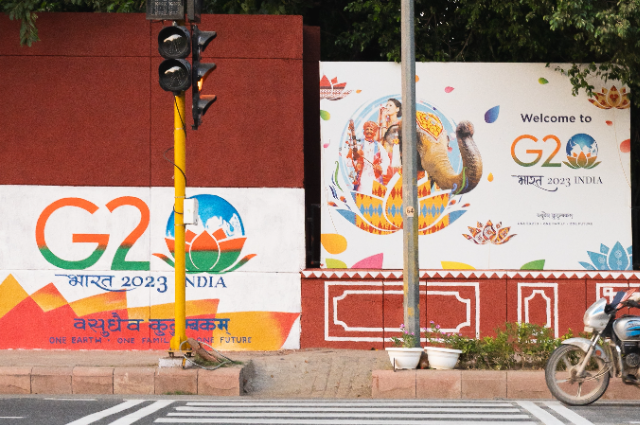
Photo by Gayatri Malhotra on Unsplash
'Vasudhaiva Kutumbakam’: The Word Is One Family
In the realm of international economic cooperation, few platforms wield as much gravitas as the Group of Twenty (G20). India's ascension to the presidency of this august body for the third time in its history, having previously assumed this role in 2002 and 2014, marks a distinctive chapter in the nation's trajectory as a burgeoning global power. Within the echelons of the G20, India has leveraged its position to adroitly espouse an agenda profoundly centered on inclusive and resilient growth, the diligent pursuit of Sustainable Development Goals (SDGs), the catalysis of green development under the auspices of the LiFE (Lifestyle for Environment) initiative, the orchestration of a technologically transformative landscape bolstered by the fortification of public digital infrastructure, the impassioned advocacy for reformation in the annals of multilateral institutions, and the impassioned advocacy of women-led development. These reverberations shall endure, guiding our world toward a future characterized by inclusivity, sustainability, and resilience. The conference, guided by the theme "One Earth, One Family, One Future," gave birth to a constellation of pioneering initiatives that heralded a new era of international collaboration and progress.
The Exalted Agenda
India's indomitable commitment to fostering inclusive and resilient growth within the G20 paradigm is emblematic of its aspiration to ensure that the dividends of economic growth redound equitably across the societal spectrum. This transcendental ethos, replete with its cognizance of income inequality, permeates through multifarious aspects of India's stewardship.
Within the G20, India, cognizant of its momentous role as a key player on the global stage, has ardently advanced the SDGs as a linchpin of its presidency. These cardinal objectives, enunciated within the United Nations 2030 Agenda, epitomize the quest for global betterment across multifaceted fronts, ranging from eradicating poverty to gender equality and from access to clean water to the relentless endeavor towards climate action.
Under India's sagacious leadership, the G20 has borne witness to the enunciation of the LiFE initiative - an avant-garde endeavor underpinned by the tenets of sustainable consumption and production paradigms. The overarching objective here is to entrench conscientious consumer choices that engender minimal environmental degradation and, in tandem, reduce the carbon footprint of humanity.
Acknowledging the transformative potency of the digital realm, India's G20 stewardship has convened cogitations on digital infrastructure, imbued with an ethos of cybersecurity and the discerning deployment of technological prowess. As a burgeoning technological epicenter, India has artfully articulated this conversation to catalyze global digital synergy.
India's perspicacity extends to the urgent need for reformation within the precincts of multifarious multilateral institutions, including but not limited to the United Nations, the World Trade Organization, and the International Monetary Fund. These reformative endeavors are aimed at galvanizing these establishments toward becoming more equitable, transparent, and accountable.
Empowering women and redressing the perennial gender imbalance stand as resolute aspirations of India's G20 presidency. The launch of the G20 Gender Equality Action Plan underscores India's zealous resolve to promote the economic and social inclusion of women on a global scale, cognizant of the incontrovertible role women play in the tapestry of sustainable development and economic prosperity.
A Panoply of Endeavors
India's G20 presidency is adorned with a plethora of meticulously orchestrated endeavors, enmeshed in a tapestry of over 150 events comprising ministerial deliberations, cogent working groups, and edifying side events. These convocations have served as veritable crucibles for deliberations, knowledge dissemination, and collaborative engagement among the diverse G20 member nations, fortifying their commitment to collective action.
The Embodiments of Initiative
At the forefront of these transformative initiatives was the G20 Digital Public Infrastructure (DPI) Alliance, an ambitious undertaking that encapsulates the essence of the digital age. The DPI Alliance aspires to create a global digital ecosystem where the barriers of geography and technology dissolve. It envisions a world where digital connectivity becomes a fundamental human right, facilitated by open, interoperable, and secure digital standards. This initiative recognizes that in an interconnected world, access to digital resources is crucial for equitable development and economic growth.
Concurrently, the G20 Climate Finance Platform emerged as a beacon of hope in the struggle against climate change. Its mission is nothing short of mobilizing substantial climate finance for developing nations. This resonates with the global commitment to combatting climate change and achieving sustainability. By fostering investments in sustainable infrastructure and renewable energy, the platform paves the way for economies to flourish while simultaneously reducing their carbon footprint.

Photo by ThisisEngineering RAEng on Unsplash
The G20 Global Food Security Network, a product of the conference's deliberations, represents a resolute response to the persistent challenge of hunger that afflicts millions worldwide. This network envisages a future where food is abundant and accessible to all. It seeks to revolutionize agriculture through innovation, equitable resource distribution, and the reduction of food wastage. In doing so, it envisions a world where no soul languishes in the grip of hunger's despair.
The vicissitudes of the COVID-19 pandemic have necessitated profound global recalibration, and in this crucible, India has played a catalytic role in orchestrating the G20's response, leading to the formation of the G20 Pandemic Preparedness and Response Framework. This framework reflects a solemn commitment to fortify global health infrastructure and preparedness. It advocates for equitable access to vaccines, treatments, and medical knowledge-sharing to ensure that nations are better prepared to confront health crises. In essence, it heralds an era of global health resilience, where pandemics are met with collective strength rather than global vulnerability.
India's G20 presidency has borne witness to a coterie of distinguished visits from the likes of the US President, the Chinese President, and the German Chancellor, marking epochs of diplomatic engagement that transcend the banalities of international protocol. These meetings have served as crucibles for high-stakes bilateral dialogues, engendering cordial relations and reaffirming India's growing significance on the global stage.
The Suggestions
However, the conference's significance extended far beyond these groundbreaking initiatives. Its conclusions reverberated with the urgency of collective action on critical issues. The call for intensified global economic cooperation highlighted the importance of sustainable growth and job creation while addressing the glaring disparities that mar our world. This consensus recognized that prosperity is not a zero-sum game; rather, it is a shared responsibility and opportunity.
The pledge to achieve net-zero emissions by mid-century underscored the pressing urgency of mitigating climate change. It conveyed the message that nations are willing to transcend their differences to protect the planet for future generations, demonstrating the power of multilateralism. The conference's resolve to address these fundamental human needs was unwavering, reflecting a commitment to the fundamental principles of human dignity and well-being. The conference was also a repository of sagacious suggestions, born out of collective wisdom. These recommendations beckon toward a future marked by inclusivity, resilience, and sustainability. Policies to ensure the equitable distribution of economic growth, fortified by targeted social safety nets, were put forth. They seek to create a society where no one is left behind, even in the face of economic uncertainties. The digital transformation, a defining characteristic of our age, found its place in the suggestions. These recommendations urged the harnessing of technology's transformative power while safeguarding cybersecurity and data privacy. Moreover, the conference highlighted the importance of investing in sustainable and resilient infrastructure. These suggestions called for prioritizing projects that enhance connectivity, reduce carbon emissions, and promote economic development. Such investments were seen as essential for fostering economic growth while preserving the planet's fragile ecosystems. The conference's suggestions encompassed policies to promote women's economic empowerment, elevate their representation in leadership roles, and eradicate the scourge of gender-based violence. In this vision, societies become more equitable and just, harnessing the full potential of their human capital.
Transcontinental Economic Connectivity
The India-Middle East-Europe (IMEC) Economic Corridor represents a visionary transcontinental undertaking, epitomizing the zenith of international economic cooperation. Conceived as an intricate nexus of transnational rail and maritime routes, it seeks to interlink the economic juggernauts of India, the Middle East, and Europe. Its formal announcement underscored its exalted stature within the pantheon of international initiatives.
The IMEC is an architectural marvel composed of two distinct, albeit symbiotic, corridors: East Corridor and Northern Corridor. The Eastern Corridor corridor serves as the linchpin, meticulously uniting India's burgeoning economic powerhouse with the dynamic markets of the Arabian Gulf. It promises to facilitate the unimpeded flow of goods and resources, culminating in a crescendo of economic synergy and reciprocal prosperity. In parallel, the Northern Corridor assumes a role of paramount importance, forging an indispensable link between the Arabian Gulf and Europe. Creating a reliable conduit for the exchange of goods and resources across these regions, not only effaces the barriers of distance but also augments the prospects for economic collaboration and investment prospects.
The genesis of the IMEC is a testament to the assiduous collaborative efforts spearheaded by India, complemented by strategic alliances with global stakeholders such as the United States and the European Union. Furthermore, pivotal Middle Eastern nations, including Saudi Arabia, the United Arab Emirates, and Israel, have galvanized their resources and collective vision to partake in this monumental endeavor, amplifying its resonance and global significance.
The IMEC's transcendental significance reverberates on multiple frequencies. Beyond its potential to catapult trade and economic growth within the trilateral ambit of India, the Middle East, and Europe, it serves as an efficacious conduit for the expeditious and cost-effective movement of goods, carving a path towards the optimization of economic potentials. Beyond the realm of trade, it augments the potential for employment generation and the creation of fertile grounds for investment.

Photo by Josef Stepanek on Unsplash
While the IMEC is at an embryonic stage of development, preliminary alignment blueprints for the railway routes have been meticulously delineated, and the edifice's financial contours are in the final stages of definition. However, it is paramount to acknowledge that the IMEC, owing to its complexity, harbors multifaceted challenges. The exigencies of harmonizing efforts across an array of nations and addressing the considerable costs associated with its realization are formidable hurdles. In addition, its trajectory may intersect regions mired in geopolitical turbulence, thereby engendering security concerns that necessitate a nuanced approach.
In stark contrast to China's Belt and Road Initiative (BRI), the IMEC emerges as a distinct and compelling alternative. While the BRI is predominantly driven by China, the IMEC is an embodiment of synergy among multiple sovereign nations, conferring upon it a rich tapestry of diversity and inclusivity. The IMEC also exalts the primacy of crafting top-tier infrastructure while hewing to internationally recognized norms and standards.
A Manifesto for Global Transformation
The Delhi Declaration, a sweeping compendium of principles and imperatives, canvasses an extensive spectrum of global concerns, encompassing economic expansion, sustainable advancement, climate dynamics, and global well-being. This document holds eminence by virtue of encapsulating the unanimous consensus of the G20's paramount leaders on these paramount issues, delineating a course of action in the face of a rapidly evolving global landscape.
In a contemporary milieu besieged by multifarious trials, notably the confluence of a worldwide economic deceleration, the relentless onslaught of the COVID-19 pandemic, and the tumultuous backdrop of the Ukraine conflict, the Delhi Declaration assumes an unparalleled significance. It emerges as an unwavering testament to the collective resolve of G20 leaders, poised to confront these monumental challenges with unwavering determination and cooperation.
The Delhi Declaration, as a compass for the G20's collective mission, reiterates an unswerving commitment to robust, sustainable, equitable, and all-encompassing growth. It further underscores the steadfast allegiance to the 2030 Agenda for Sustainable Development and the Paris Agreement, representing an unequivocal dedication to ushering in an era of environmental responsibility.
Economic Growth Pledge
In a testament to their unwavering commitment to economic stability and progress, the G20 leaders, as articulated in the Delhi Declaration, have vowed to implement judicious and meticulously calibrated policies. These policies, bearing the hallmarks of sagacity and prudence, are designed not only to stimulate economic growth but also to meticulously curtail disparities that have long marred global economic landscapes. With an astute recognition of the intricate interplay of financial stability and macroeconomic equilibrium, this pledge is a resounding endorsement of their resolve to ensure a robust and inclusive economic future.
Sustainable Development Pledge

Image by Annette from Pixabay
Embedded within the fabric of the Delhi Declaration is a profound and earnest commitment to accelerate the pursuit of the Sustainable Development Goals (SDGs). A clarion call for global responsibility, this pledge signifies an unwavering dedication to forging a world where economic advancement coexists harmoniously with environmental stewardship. The declaration's championing of Lifestyles for Sustainable Development (LiFE) and the preservation of biodiversity, forests, and oceans echoes the G20 leaders' profound understanding of the intrinsic linkages between sustainable development and the well-being of our planet, underlining their shared determination to preserve and protect it for generations to come.
Climate Change Pledge
In a momentous stride towards combating the existential threat of climate change, the G20 leaders united in purpose, have pledged to achieve net-zero emissions by the pivotal year 2050, if not sooner. This pledge, marked by its foresight and global vision, transcends borders and acknowledges the collective responsibility of nations to address the climate crisis head-on. Furthermore, the commitment to mobilize an annual sum of $100 billion to support climate finance for developing nations is an emblem of their resolute stance in fortifying the global response to climate change, reaffirming the G20's pivotal role in shaping a sustainable and resilient world.
Global Health Pledge
The Delhi Declaration, as a testament to the G20's unwavering commitment to the sanctity of human health, affirms their collective pledge to strengthen the global health architecture. With an emphasis on equitable access to vaccines, therapeutics, and diagnostics, this commitment underscores the imperative of leaving no nation or individual behind in the pursuit of global health resilience. In a world grappling with the profound challenges posed by pandemics, this pledge resonates as a beacon of hope, signaling the G20 leaders' unyielding resolve to safeguard the well-being of humanity at large, transcending borders and disparities.
The G20's Multifaceted Significance
To fathom the resonance of India's G20 presidency, it is imperative to appraise the G20 itself. Comprising the lion's share of the world's economic powerhouses, the G20 conglomerate represents approximately 80% of the globe's Gross Domestic Product (GDP) and controls a staggering 75% of the intricate tapestry of global trade. This makes the G20 a preeminent forum for the formulation and coordination of international economic policies and an indispensable vector for international economic stability.
Yet, the G20's compass extends far beyond the purview of economics. It serves as a crucible for addressing an eclectic array of concerns encompassing financial regulation, climate change mitigation, and the orchestration of a concerted global response against the specter of terrorism. In this tapestry of multifarious challenges, the G20 stands as the lodestar for global economic deliberations and has progressively emerged as a formidable agent for the navigation of a dynamic and intricate world order.
Denouement
India's G20 presidency is emblematic of the nation's burgeoning stature as a global power, poised to shape the contours of an equitable and sustainable global landscape. Through its erudite enunciation of inclusive growth paradigms, the unwavering advocacy of the SDGs, the tenacious espousal of green development under the aegis of the LiFE initiative, the judicious curation of a technologically transformative tableau, and the relentless pursuit of multilateral reform and gender parity, India has presided over a G20 presidency that is as monumental as it is forward-looking.
